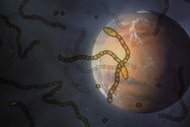Create a free profile to get unlimited access to exclusive videos, sweepstakes, and more!
Asteroids Smashing into the Early Earth Boiled the Oceans and Might Have Kickstarted Life
Sometimes growth is painful.

A large enough asteroid could spell the end of life on our planet, or at least the end of our species. In the sci-fi disaster flick Asteroid vs. Earth (streaming now on Peacock), a planet-killing impactor is on a collision course with Earth, and there’s nothing we can do to stop it. With no other options, humanity’s brightest (and most unhinged) minds craft a plan to move the planet itself out of the way.
These days, space rocks are one of the most universal planetary threats, but a few billion years ago, they may have been the secret ingredient we needed in the recipe for life. That’s according to new research presented at a recent meeting of the American Geophysical Union (AGU).
Before Life Could Evolve on our Planet, We Had to Get Hit by Asteroids a Couple Times
The early days of the solar system were a time of significant tumult. Our solar system began as a diffuse cloud of gas and dust slowly coalescing. Over time, the unerring pull of gravity formed those primordial materials into planets, moons, and scattered bits of ice and rock. As they kept turning along the vast cosmic dance floor, their now solidified bits smashed into one another, forming ever larger objects like the Earth.
RELATED: Astronomers Find a Dozen Unexpected Space Objects Way Outside the Kuiper Belt
Those early years were marked by violent collisions and a constant re-ordering of matter. It’s incredibly unlikely that anything was alive on our planet or anywhere else in the system during that time period, but it may have been crucial for the development of life later on. Perhaps the most notable collision of our planet’s infancy is that of the proto-Earth and another fledgling planet called Theia.
Believed to have been roughly the size of Mars, Theia was a still-molten world which crashed into our planet approximately 4 billion years ago. Both planets smooshed into one another, spilling planetary guts into the surrounding space. All of those ejected bits eventually came together and formed the Moon. Recent research suggests that parts of Theia may have survived mostly intact and are embedded in the Earth’s mantle.
While the Theia impact was undoubtedly the most intense dustup our planet has ever experienced, it wasn’t the only one. Another impact, roughly 3.26 billion years ago, involved smashing into a rock roughly four times the size of Mount Everest. It would have made Chicxulub, the asteroid that killed the dinosaurs, look like a slap on the wrist by comparison.
RELATED: Earth’s Mantle May be Partially Made Up of a Different, Dead Planet
Scientists suggest that the force of these impacts would have introduced so much energy to the system it would have caused the top layer of the ocean to boil off. The world would have been plunged beneath a thick quilt of water vapor, dust, and darkness. Somehow, in the aftermath, life emerged and later evolved to the point that it could peer back through time to unravel what happened.
The events of the early Earth are difficult to parse because the geological record from that time has largely been wiped clean over the eons. Researchers rely on subtle fingerprints left in rock layers to find evidence of ancient impacts and then use simulations to recreate the events and see what might have occurred.
Simulations suggest that when Theia (or any other sufficiently massive impactor) struck the Earth it would have vaporized pretty much everything in its path. Water, of course, but not just that. Rock itself, perhaps even the metal-rich core of the impactor, would have been vaporized and added to a rapidly growing, chemically rich steam atmosphere. All of that hot and heavy steam would have been filled with all sorts of chemical goodies rip roaring and ready to bind into more interesting prebiotic molecules.
It’s unclear how much chemical mixing took place between impactors and the early Earth, but it’s possible that the unique chemistry taking place after a particularly violent sucker punch might have been crucial for life emerging on our planet. We’re not saying we want another asteroid impact anytime soon (or ever), but we might owe them our very existence.
Catch Asteroid vs Earth streaming right now on Peacock. And keep your eyes to the sky.




























